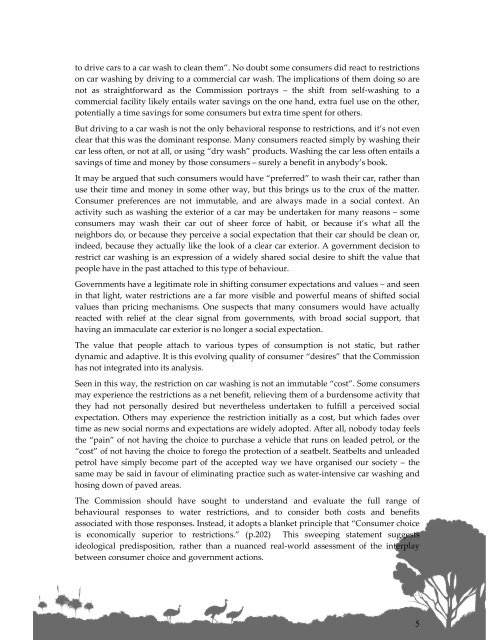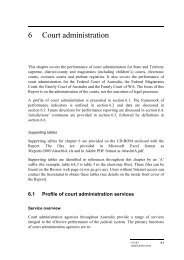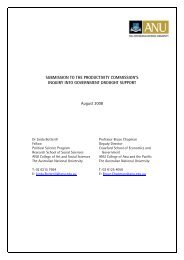Australian Conservation Foundation - Productivity Commission
Australian Conservation Foundation - Productivity Commission
Australian Conservation Foundation - Productivity Commission
Create successful ePaper yourself
Turn your PDF publications into a flip-book with our unique Google optimized e-Paper software.
to drive cars to a car wash to clean them”. No doubt some consumers did react to restrictions<br />
on car washing by driving to a commercial car wash. The implications of them doing so are<br />
not as straightforward as the <strong>Commission</strong> portrays – the shift from self-washing to a<br />
commercial facility likely entails water savings on the one hand, extra fuel use on the other,<br />
potentially a time savings for some consumers but extra time spent for others.<br />
But driving to a car wash is not the only behavioral response to restrictions, and it’s not even<br />
clear that this was the dominant response. Many consumers reacted simply by washing their<br />
car less often, or not at all, or using “dry wash” products. Washing the car less often entails a<br />
savings of time and money by those consumers – surely a benefit in anybody’s book.<br />
It may be argued that such consumers would have “preferred” to wash their car, rather than<br />
use their time and money in some other way, but this brings us to the crux of the matter.<br />
Consumer preferences are not immutable, and are always made in a social context. An<br />
activity such as washing the exterior of a car may be undertaken for many reasons – some<br />
consumers may wash their car out of sheer force of habit, or because it’s what all the<br />
neighbors do, or because they perceive a social expectation that their car should be clean or,<br />
indeed, because they actually like the look of a clear car exterior. A government decision to<br />
restrict car washing is an expression of a widely shared social desire to shift the value that<br />
people have in the past attached to this type of behaviour.<br />
Governments have a legitimate role in shifting consumer expectations and values – and seen<br />
in that light, water restrictions are a far more visible and powerful means of shifted social<br />
values than pricing mechanisms. One suspects that many consumers would have actually<br />
reacted with relief at the clear signal from governments, with broad social support, that<br />
having an immaculate car exterior is no longer a social expectation.<br />
The value that people attach to various types of consumption is not static, but rather<br />
dynamic and adaptive. It is this evolving quality of consumer “desires” that the <strong>Commission</strong><br />
has not integrated into its analysis.<br />
Seen in this way, the restriction on car washing is not an immutable “cost”. Some consumers<br />
may experience the restrictions as a net benefit, relieving them of a burdensome activity that<br />
they had not personally desired but nevertheless undertaken to fulfill a perceived social<br />
expectation. Others may experience the restriction initially as a cost, but which fades over<br />
time as new social norms and expectations are widely adopted. After all, nobody today feels<br />
the “pain” of not having the choice to purchase a vehicle that runs on leaded petrol, or the<br />
“cost” of not having the choice to forego the protection of a seatbelt. Seatbelts and unleaded<br />
petrol have simply become part of the accepted way we have organised our society – the<br />
same may be said in favour of eliminating practice such as water-intensive car washing and<br />
hosing down of paved areas.<br />
The <strong>Commission</strong> should have sought to understand and evaluate the full range of<br />
behavioural responses to water restrictions, and to consider both costs and benefits<br />
associated with those responses. Instead, it adopts a blanket principle that “Consumer choice<br />
is economically superior to restrictions.” (p.202) This sweeping statement suggests<br />
ideological predisposition, rather than a nuanced real-world assessment of the interplay<br />
between consumer choice and government actions.<br />
5
















